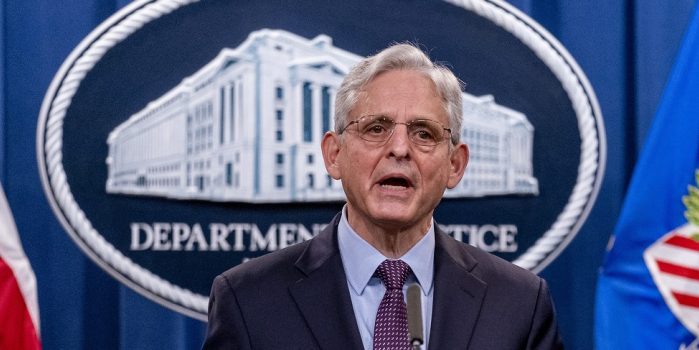(Ken Silva, Headline USA) During a Senate Judiciary Committee hearing on Wednesday, Sen. Josh Hawley, R-Mo., asked Attorney General Merrick Garland how many informants the FBI has inside America’s Catholic churches.
Hawley’s question was in relation to a recently leaked FBI bulletin, which assessed “radical-traditionalist Catholics” as potential violent domestic extremists. Garland told Hawley that he disagreed with the FBI memo—which has since been rescinded—but that he doesn’t know how many informants are embedded in Catholic churches.
“I don’t know, and I don’t believe we have any informants aimed at Catholic churches,” Garland responded, explaining that the DOJ has a rule against investigating First Amendment-protected activity.
While Garland may profess ignorance about the matter, an abundance of circumstantial evidence indicates that the FBI indeed has informants in Catholic churches, as well as a variety of other religious institutions.
For starters, the FBI does have a program to embed informants in churches, congressional offices, the media and other “sensitive” institutions—as Headline USA has previously reported.
Federal guidelines establish stricter rules for embedding informants in “sensitive” institutions than it does for embedding informants in companies, social clubs or other groups potentially involved in criminal activity. This might lead one to believe that the FBI is highly selective in using informants to target places such as churches.
However, the Washington Times revealed last year that the FBI breaks its own rules frequently—more than 747 times in 18 months, or about two times per case—when conducting “sensitive” investigations. This raises the possibility that the FBI could embed informants in churches and other sensitive institutions, even when doing so violates the bureau’s own rules.
Moreover, the Washington Times report only delved into the FBI’s sensitive “investigations.” It did not examine potential FBI abuses when it comes to conducting “assessments” into sensitive institutions.
FBI assessments entail surveillance activities that fall short of a full-blown investigation. They can be launched without a factual predicate of criminal wrongdoing, meaning that they can be used to embed informants in groups without any link to criminality.
In other words, the FBI doesn’t need to have an investigation open in order to have informants in Catholic churches or other places. And indeed, the bureau was caught using its assessment authority to infiltrate mosques and spy on Muslims about a decade ago.
Rep. Nancy Mace, R-S.C., asked the Government Accountability Office to audit the FBI’s use of assessments last year.
The GAO has not commented on whether it’s conducting such an audit. If and when the GAO does, it’s likely that the report will reveal more widespread abuse—including the use of informants to spy on Catholic churches.
Ken Silva is a staff writer at Headline USA. Follow him at twitter.com/jd_cashless.

